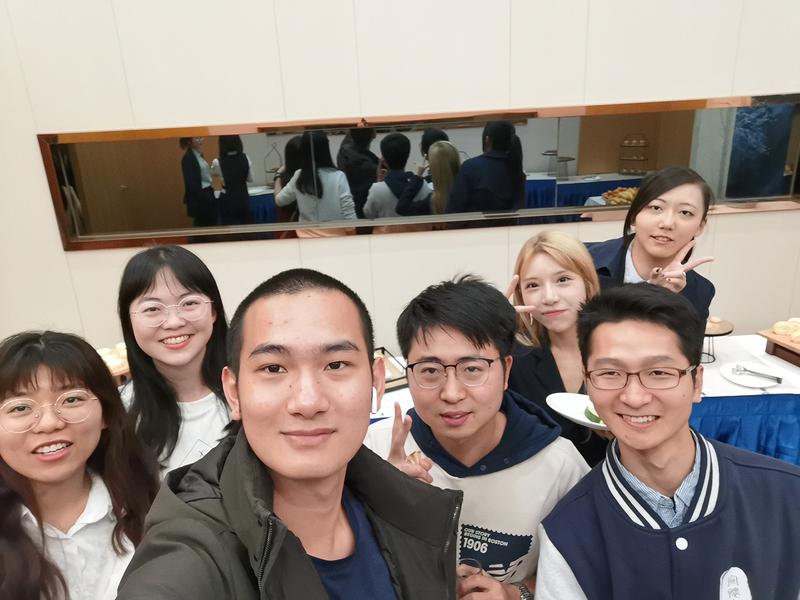Undergraduate helps create fresh way of teaching entrepreneurial skills and strategies, Cao Chen reports in Shanghai.
 David Chen (second from left) and his team receive the third prize at the Google Cup Entrepreneurship Competition held at Shanghai Jiao Tong University in 2020. (PHOTO PROVIDED TO CHINA DAILY)
David Chen (second from left) and his team receive the third prize at the Google Cup Entrepreneurship Competition held at Shanghai Jiao Tong University in 2020. (PHOTO PROVIDED TO CHINA DAILY)
Mystery games have enjoyed a growing popularity in China, with throngs of youngsters banding together to spend hours solving fictional crimes.
This new trend might even spread to the academic sphere in the near future, courtesy of David Chen, a marketing undergraduate at Shanghai Jiao Tong University, and his peers from 12 Chinese universities.
When you are an entrepreneur, it’s vital that you believe in yourself and ignore the doubts of others. When unsolvable problems occur, you must ensure you are not overly attached to the project and know when to give up.
David Chen, marketing undergraduate at Shanghai Jiao Tong University
The American is part of a team that is looking to incorporate the role-playing nature of mystery games into the pedagogy for the university's international business course.
Over the past several months, the team has been creating scripts and teaching manuals for classes where students get to role-play historically famous business figures in order to better understand their strategies and negotiation tactics.
"We have finished two scripts based on the school's database and will carry out internal tests soon. I'm looking forward to it," says Chen.
The 21-year-old is no stranger to the art of negotiation. According to Chen, he was first exposed to this integral aspect of business when he accompanied his father, who is a businessman dealing with international investments, to conferences and meetings in Asia.
"Observing their meetings was like hearing stories. I had already learned a lot about business by the time I was 16," Chen says. "My father has constantly imparted to me the fundamentals of doing business."
One memorable learning experience, he recalls, took place in Boracay in the Philippines, where Chen and his family wanted to buy some drinks, but had no cash on them as they were all clad in swimming attire.
"When we approached a stall on the beach and explained our situation, the merchant allowed us to have the drink first and pay him another day. We were so glad. When we returned home, my father taught me that showing faith in one's customers would result in customers repaying that faith," he says.
The childhood that Chen experienced has inherently helped him to develop a strong business acumen and an inquisitive mind that never stops asking questions about how to improve things to maximize profits.
 Chen (third from left) and his classmates at a roadshow of an innovation competition held in Taicang, Jiangsu province, in 2020. (PHOTO PROVIDED TO CHINA DAILY)
Chen (third from left) and his classmates at a roadshow of an innovation competition held in Taicang, Jiangsu province, in 2020. (PHOTO PROVIDED TO CHINA DAILY)
For example, when he came across a long line of people outside a milk tea store, Chen recalls that he immediately pondered potential solutions that could leverage the power of computer algorithms to improve the efficiency of resource allocation.
His keen interest in business and innovation has also seen him take part in many entrepreneurship competitions since his high school days.
In a competition held by Harvard University in 2017, the team Chen was in came up with the idea of establishing a platform through which students can apply for internships offered by local enterprises.
In 2019, when his family relocated to Shanghai, Chen followed up on his passion by pursuing a bachelor's degree in international business at Shanghai Jiao Tong University. This move, he adds, has been a life-changing one because of a local entrepreneurship camp he got to attend.
"The competitions in high school offered opportunities that spurred the imagination and allowed me to accumulate entrepreneurial knowledge, but the camp was the real thing-there were real investors looking for real projects," he says.
At the camp, Chen's team of six brainstormed business opportunities and drafted a strategic plan before presenting their ideas to the investors.
"We found that many Shanghai high school students would go abroad for extracurricular research to enhance their academic capabilities and competitiveness, but some research projects lack supervision. As such, we proposed launching an online platform where domestic students can pay to attend high-quality domestic research projects at universities," he explains.
Chen and his teammates eventually attracted 200,000 yuan ($31,404) in investments, which they used to set up Shanghai Zhigu Culture Communication in early 2020. However, the pandemic quickly upended their plans to promote their services.
"It was difficult to approach customers during those first few months, as our team members were based in different countries and the number of students studying overseas plummeted. When the situation got better in China, many platforms offering similar services started emerging and offered stiff competition," says Chen.
The project team was eventually disbanded, with the company now owned by one of the team members. This failure, however, has not diminished Chen's love for doing business.
"When you are an entrepreneur, it's vital that you believe in yourself and ignore the doubts of others. When unsolvable problems occur, you must ensure you are not overly attached to the project and know when to give up," he says.
Chen has since joined entrepreneurship training courses at the university where he shares insights with students from different backgrounds and seeks out new projects.
"Hardship and failure are friends of mine every day as an entrepreneur. Their presence means that there are things to improve," says Chen.
"I cannot run away from obstacles. I need to face them. That's the only way to advance toward my goals."
Contact the writer at caochen@chinadaily.com.cn


